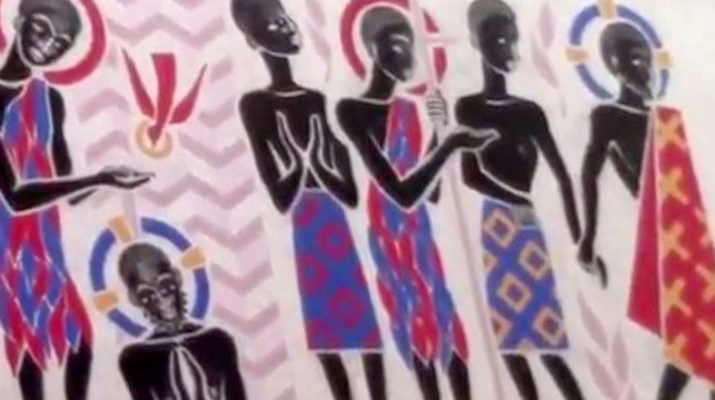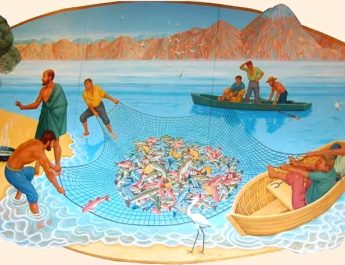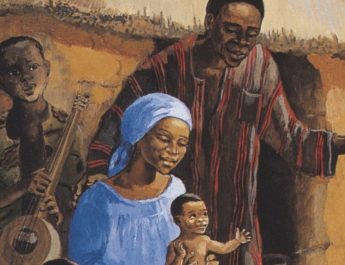John 1:19-34
Narrative Lectionary 419
19 This isA the testimonyB given by JohnC when the JewsD
A “is” = eimi. This is to be or exist.
B “testimony” = marturia. From martureo (to bear witness, testify, give evidence; to testify in a literal or figurative sense); from martus (a witness whether having heard or seen something; witness literally, judicially, or figuratively; by analogy, a martyr). This is testimony, witness, evidence, record, reputation.
C “John” = Ioannes. From Hebrew yochanan (Johanan); from Yehochanan (“the Lord has been gracious”); {from YHVH (proper name of the God of Israel); {from havah (to become); from hayah (to be, exist, happen)} + chanan (beseech, show favor, be gracious; properly, to bend in kindness to someone with less status). This is John, meaning “the Lord has been gracious.”
D “Jews” = Ioudaios. From Ioudas (Judah, Juadas); from Hebrew Yehudah (Judah, son of Jacob, his tribal descendants, a name for the southern kingdom. Literally, it means praised); probably from yadah (to throw one’s hands into the air in a gesture of praise); from yad (hand). This is Jewish, a Jew, or Judea.
sentE priestsF and LevitesG from JerusalemH to askI him, “Who are you?”
E “sent” = apostello. From apo (from, away from) + stello (to send, set, arrange, prepare, gather up); {probably from histemi (to make to stand, stand, place, set up, establish, appoint, stand firm, be steadfast)}. This is to send forth, send away, dismiss, send as a messenger. It implies one that is sent for a particular mission or purpose rather than a quick errand. This is where “apostle” comes from.
F “priests” = hiereus. From hieros (sacred, something sacred, temple, holy, set apart; something consecrated to God or a god). This is a priest, used for Jewish and Gentile priests.
G “Levites” = Leuites. 3x in NT. From Leui (Levi, the tribe or a name); from Hebrew Levi (Levi, or the tribe of Levi). This is someone descended from Levi who assists priests.
H “Jerusalem” = Hierosoluma. From Hebrew yerushalaim (probably foundation of peace); {from yarah (to throw, shoot, be stunned; to flow as water so figuratively to instruct or teach) + shalam (to make amends, to be complete or sound)}. This is Jerusalem, dwelling of peace.
I “ask” = erotao. From eromai (to ask) OR from ereo (to say, tell, call, speak of). This is asking a question or making an earnest request. It is used between someone with whom the asker is close in some sense. So, they anticipate special consideration for their request.
20 He confessedJ and did not denyK it, but confessed, “I am not the Messiah.”L
J “confessed” = homologeo. From homologos (of one mind); {from homos (the same) + lego (to say, speak, tell)}. This is to agree, speak the same, declare, promise, praise, celebrate. It can mean to align with, express the same conclusion, endorse.
K “deny” = arneomai. From a (not) + rheo (say, speak of). This is to deny, disown, refuse, repudiate someone or a previously held belief, to contradict.
L “Messiah” = Christos. From chrio (consecrate by anointing with oil; often done for prophets, priests, or kings). Literally, the anointed one, Christ. The Greek word for Messiah.
21 And they asked him, “What then? Are you Elijah?”M
He said,N “I am not.”
“Are you the prophet?”O
He answered,P “No.”
M “Elijah” = Elias. Related to “John” in v19. From Hebrew Eliyyah (Elijah) {from el (God, god) + Yah (the shortened form of the name of the God of Israel; God, Lord); {from YHVH (see note C above)}. This is Elijah, “The Lord is God.”
N “said” = lego. Related to “confessed” in v20. See note J above.
O “prophet” = prophetes. From pro (before, in front of, earlier than) + phemi (to declare, say, use contrasts in speaking to shed light on one point of view); {from phao (to shine) or phaino (to bring light, cause to appear, shine, become visible or clear)}. This is a prophet or poet – one who speaks with inspiration from God.
P “answered” = apokrinomai. From apo (from, away from) + krino (to judge, decide, think good, condemn, determine, pass judgment, stand trial, sue; judging whether in court or in a private setting; properly, mentally separating or distinguishing an issue – to come to a choice or decision, to judge positively or negatively in seeking what is right or wrong, who is innocent or guilty; can imply trying, condemning, punishing, or avenging). This is to reply or respond, to draw one’s own conclusions, to speak when one is expected to.
22 Then they said to him, “Who are you? Let us haveQ an answerR for those who sentS us. What do you say about yourself?”
Q “have” = didomi. To give, offer, place, bestow, deliver. This is give in a literal or figurative sense.
R “answer” = apokrisis. Related to “answered” in v21. 4x in NT. From apokrinomai (see note P above). This is an answer or response.
S “sent” = pempo. This is to send, put forth, or dispatch. This often refers to a temporary errand. It is sending someone with a focus on the place they departed from. By contrast, another Greek word, hiemi, emphasizes the destination and yet another word, stello, focuses on the motion that goes with the sending.
23 He said,T
“I am the voiceU of one crying outV in the wilderness,W
T “said” = phemi. Related to “prophet” in v21. See note O above.
U “voice” = phone. Related to “prophet” in v21 & “said” in v23. Probably from phemi (see note O above). This is a voice, sound, tone or noise. It can also be a language or dialect.
V “crying out” = boao. 12x in NT. From boe (a cry or shout). This is cry out, make a distress call, ask for desperately need assistance.
W “wilderness” = eremos. Properly, a place that is not settled or farmed, not populated. It could be a deserted area or a desert place. It could be seen as secluded, solitary, or lonesome. Any kind of vegetation is sparse, but so are people generally.
‘Make straightX the wayY of the Lord,’”Z
as the prophet IsaiahAA said.
X “make straight” = euthuno. 2x in NT. From euthus (immediately, upright, straight and not crooked); {perhaps from eu (good, well, well done, rightly) + tithemi (to place, lay, set, establish)}. This is to guide, steer, make a straight direction.
Y “way” = hodos. This is way, road, path, or journey. It can imply progress along a route.
Z “Lord” = Kurios. From kuros (authority, supremacy). This is a respectful address meaning master or sir. It refers to one who has control or power greater than one’s own. So, it was also applied to God and Jesus as Master or Lord.
AA “Isaiah” = Esaias. Related to “John” in v19 & “Elijah” in v 21. From Hebrew Yeshayahu (Isaiah, “salvation of the Lord”); {from yasha (to deliver, defend, help, preserve, rescue; properly, to be open, wide or free, which implies being safe; to free someone) + Yah (the shortened form of the name of the God of Israel; God, Lord); {from YHVH (see note C above)}. This is Isaiah, meaning “salvation of the Lord.”
24 Now they had been sentBB from the Pharisees.CC 25 They asked him, “Why then are you baptizingDD if you are neither the Messiah, nor Elijah, nor the prophet?”
BB “sent” = apostello. Same as “sent” in v19. See note E above.
CC “Pharisees” = Pharisaios. From Aramaic peras (to divide, separate) and from Hebrew parash (to make distinct, separate, scatter). This is a Pharisee, a member of a Jewish sect active in the 1st century. Their name meant separate in the sense of wanting to live a life separated from sin. Whereas the Sadducees were part of the priestly line and inherited their religious position and responsibilities, Pharisees were regular people who studied the scriptures and offered guidance to regular folk. Sadducees were often wealthier and willing to sacrifice their identity to rub elbows with Roman society. Pharisees were often more concerned with what it meant to follow God without compromising what made them different as followers of God. Sadducees primarily believed in that which was written down (the first five books of the Bible) and Pharisees believed in the Bible and the traditions of the elders. Pharisees had a very wide range of interpretations and diversity of opinion. Their standard mode of religious engagement was lively debate with one another. To argue religion with another teacher was to recognize that they had something of value to offer.
DD “baptizing” = baptizo. From bapto (to dip or dye; to entirely cover with liquid, to stain). This is to submerge, wash, or immerse. Used specially for baptism.
26 John answered them, “I baptize with water.EE AmongFF you standsGG one whom you do not know,HH
EE “water” = hudor. Perhaps from huetos (rain); from huo (to rain). This is water literal or figurative. It is one of the roots that “hydrogen” and “hydroelectric” come from.
FF “among” = mesos. Perhaps from meta (with among, behind, beyond; implies a change following contact or action). This is middle, among, center, midst.
GG “stands” = histemi. Related to “sent” in v19. See note E above.
HH “know” = eido. This is to know, consider perceive, appreciate, behold, or remember. It means seeing with one’s eyes, but also figuratively, it means perceiving – seeing that becomes understanding. So, by implication, this means knowing or being aware.
27 the one who is comingII after me; I am not worthyJJ to untieKK the thongLL of his sandal.”MM
II “coming” = erchomai. This is to come or go.
JJ “worthy” = axios. From ago (to lead, bring, carry, guide, drive, go). This is related to weight or worth – deserving, suitable, corresponding, due reward.
KK “untie” = luo. This is to loose, release, or untie. Figuratively, it can mean to break, destroy, or annul. This is releasing what had been withheld.
LL “thong” = himas. 4x in NT. Perhaps from the same as hama (at one, together with, early). This is a thong like a part of a sandal or a strap that is part of a scourge.
MM “sandal” = hupodema. 10x in NT. From hupodeo (to bind under wear on the feet); {from hupo (by, under, about, subordinate to) + deo (to tie, bind, fasten, impel, compel; to declare something against the law or prohibited)}. This is a sandal – something bound under the sole.
28 This took placeNN in BethanyOO across the JordanPP where John was baptizing.
NN “took place” = ginomai. This is to come into being, to happen, become, be born. It can be to emerge from one state or condition to another or is coming into being with the sense of movement or growth.
OO “Bethany” = Bethania. 12x in NT. From Aramaic beth anya (house of affliction, misery, wretchedness). This is Bethany.
PP “Jordan” = Iordanes. 15x in NT. From Hebrew yarden (Jordan river, meaning “descending”); from yarad (to go down, descend; going down in a literal or figurative sense; going to the shore or a boundary, bringing down an enemy). This is the Jordan River, meaning “descending.”
29 The next day he sawQQ JesusRR coming toward him and declared, “HereSS is the LambTT of GodUU
QQ “saw” = blepo. This is literally to see – it is primarily used in the physical sense. However, figuratively it can be seeing, which includes attention and so to watchfulness, being observant, perceiving, and acting on the visual information. It can also mean beware.
RR “Jesus” = Iesous. Related to “John” in v19 & “Elijah” in v21 & “Isaiah” in v23. From Hebrew Yehoshua (Joshua, the Lord is salvation); {from YHVH (see note C above)} + yasha (to deliver, defend, help, preserve, rescue; properly, to be open, wide or free, which implies being safe. So, in a causative sense, this is to free someone)}. This is Jesus or Joshua in Greek – the Lord saves or the Lord is salvation.
SS “here” = idou. Related to “know” in v26. From eido (see note HH above). This is see! Lo! Behold! Look! Used to express surprise and or draw attention to the statement.
TT “Lamb” = amnos. 4x in NT. This is lamb, used figuratively for innocence or in reference to its sacrificial use. Usually, it refers to a lamb that is one year old.
UU “God” = Theos. From Proto-Indo-European origins, meaning do, put, place. This is God or a god in general.
who takes awayVV the sinWW of the world!XX
VV “takes away” = airo. This is to lift up in a literal or figurative sense. So, it could mean to lift, carry, or raise. It could also imply lifting something in order to take it away or remove it. Figuratively, this can be used for raising the voice or level of suspense. It can mean sailing off as raising the anchor. It can also correspond to a Hebrew expression for atonement of sin (lift/remove sin).
WW “sin” = hamartia. From hamartano (to miss the mark, do wrong, make a mistake, sin); {from a (not) + meros (a part or share)}. Literally, this means not having one’s share or portion – like not receiving inheritance or what was allotted to you. This word means missing the mark so it is used for guilt, fault, and acts of sin.
XX “world” = kosmos. Perhaps from the base of komizo (to carry, convey, recover); from komeo (to take care of). This is order, the world, the universe, including its inhabitants. Literally, this is something that is ordered so it can refer to all creation. It can also refer to decoration in the sense that something is better ordered and, thus, made more beautiful. This is where “cosmos” and “cosmetics” come from.
30 This is he of whom I said, ‘After me comes a manYY who ranksZZ ahead of me because he was beforeAAA me.’ 31 I myself did not know him; but I came baptizing with water for this reason, that he might be revealedBBB to Israel.”CCC
YY “man” = aner. This is man, male, husband, or fellow. It can also refer to an individual.
ZZ “ranks” = ginomai. Same as “took place” in v28. See note NN above.
AAA “before” = protos. From pro (before, first, in front of, earlier). This is what is first, which could be the most important, the first in order, the main one, the chief.
BBB “revealed” = phaneroo. Related to “prophet” in v21 & “said” and “voice” in v23. From phaneros (visible, apparent, clear, shining); from phos (light, a source of light, fire, or radiance; light with specific reference to what it reveals; luminousness whether natural or artificial, abstract or concrete, literal or figurative); from phao (see note O above). This is to make visible or clear, to make known. Properly, it is to illumine and so to make apparent or bring into open view.
CCC “Israel” = Israel. Related to “Elijah” in v21. From Hebrew Yisrael (God strives or one who strives with God; new name for Jacob and for his offspring); {from sarah (to persist, exert oneself, contend, persevere, wrestle, prevail) + el (see note M above)}. This is Israel the people and the land.
32 And John testified,DDD “I sawEEE the SpiritFFF
DDD “testified” = martureo. Related to “testimony” in v19. See note B above.
EEE “saw” = theaomai. From thaomai (to gaze at a spectacle; to look at or contemplate as a spectator; to interpret something in efforts to grasp its significance). This is to behold, look upon, see, contemplate, visit like a spectator. This is the root of the word “theatre.”
FFF “Spirit” = Pneuma. From pneo (to blow, breath, breathe hard). This is wind, breath, or ghost. A breeze or a blast or air, a breath. Figuratively used for a spirit, the human soul or part of us that is rational. It is also used supernaturally for angels, demons, God, and the Holy Spirit. This is where pneumonia comes from.
descendingGGG from heavenHHH like a dove,III and it remainedJJJ on him.
GGG “descending” = katabaino. From kata (down, against, throughout, among) + baino (to walk, go). This is to come down whether from the sky to the ground or from higher ground to lower. It can be used in a literal or figurative sense.
HHH “heaven” = ouranos. May be related to oros (mountain, hill) with the notion of height. This is the air, the sky, the atmosphere, and heaven. It is the sky that is visible and the spiritual heaven where God dwells. Heaven implies happiness, power, and eternity.
III “dove” = peristera. 10x in NT. This is dove or pigeon.
JJJ “remained” = meno. This is to stay, remain, wait, await, continue, abide, endure. It can mean to literally stay in a place or to remain in a condition or to continue with hope and expectation.
33 I myself did not know him, but the one who sentKKK me to baptize with water said to me, ‘He on whom you seeLLL the Spirit descend and remain is the one who baptizes with the HolyMMM Spirit.’ 34 And I myself have seenNNN and have testified that this is the SonOOO of God.”
KKK “sent” = pempo. Same as “sent” in v22. See note S above.
LLL “see” = horao. To see, perceive, attend to, look upon, experience. Properly, to stare at and so implying clear discernment. This, by extension, would indicate attending to what was seen and learned. This is to see, often with a metaphorical sense. Can include inward spiritual seeing.
MMM “Holy” = hagios. From hagnos (holy, sacred, pure ethically, ritually, or ceremonially; prepared for worship, chaste, unadulterated, pure to the core; undefiled by sin; figurative for innocent, modest, perfect). God is totally different from humanity and thus set apart. That which is consecrated to worship God (elements of worship) or to serve God (as the saints) are holy because they are now set apart for God’s purposes. Holy because important to God. This is sacred physically, pure. It can be morally blameless or ceremonially consecrated.
NNN “seen” = horao. Same as “see” in v33. See note LLL above.
OOO “Son” = huios. This is son, descendant – a son whether natural born or adopted. It can be used figuratively for other forms of kinship.
Image credit: “Baptism and Leaving for the Wilderness” by Father George Saget at Keur Moussa, Senegal. Photo from Robert Harding, 1963.




